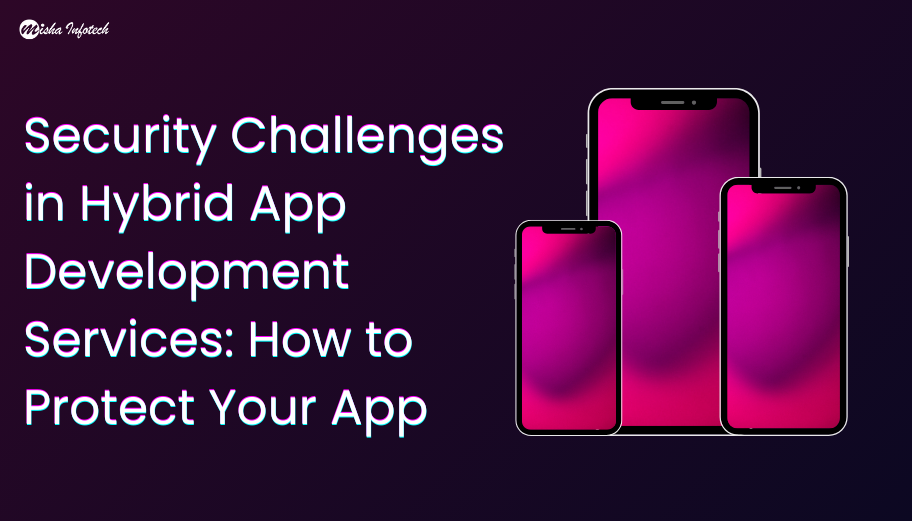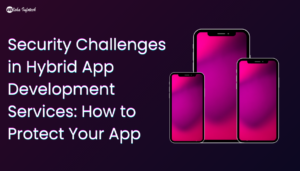In the dynamic landscape of mobile application development, hybrid apps have emerged as a popular choice for businesses seeking to reach a broader audience across multiple platforms efficiently. By blending the best of both native and web applications, hybrid apps offer versatility, cost-effectiveness, and quicker time-to-market. However, amidst these advantages lurk significant security challenges that developers must address to safeguard users’ data and maintain the integrity of their applications.
Understanding Hybrid App Security Challenges
Hybrid apps, by their nature, leverage a combination of web technologies like HTML, CSS, and JavaScript, along with native components. This amalgamation introduces a unique set of vulnerabilities that attackers can exploit. Let’s delve into some common security challenges faced by developers in hybrid app development:
1. Code Vulnerabilities:
Hybrid apps often incorporate third-party libraries and plugins to enhance functionality. However, these dependencies may contain vulnerabilities that hackers can exploit to infiltrate the app’s code, leading to data breaches or unauthorized access.
2. Data Encryption:
Ensuring the secure transmission and storage of sensitive user data is paramount in hybrid app development. Inadequate encryption mechanisms can expose data to interception during transit or compromise it when stored on the device or servers.
3. Authentication and Authorization:
Weak authentication mechanisms or improper authorization protocols can grant unauthorized users access to restricted features or sensitive information within the app, jeopardizing user privacy and security.
4. Device-Level Security:
Hybrid apps rely on underlying native components to interact with device features such as camera, GPS, or contacts. Improper management of these interactions can compromise device-level security, leading to privacy breaches or unintended access to user data.
Case Studies: Learning from Real-World Examples
Case Study 1: WhatsApp Hybrid App Encryption Flaw
WhatsApp, a widely used messaging app, faced scrutiny when security researchers discovered vulnerabilities in its hybrid app’s encryption protocol. The flaw allowed attackers to intercept and decrypt users’ messages, potentially compromising their privacy. WhatsApp swiftly addressed the issue through software updates, highlighting the importance of proactive security measures and regular audits in hybrid app development.
Case Study 2: Uber’s API Vulnerability
Uber, a leading ride-sharing service, encountered security challenges stemming from vulnerabilities in its hybrid app’s API endpoints. Hackers exploited these weaknesses to gain unauthorized access to user accounts and sensitive trip data. Uber responded by enhancing its API security measures and implementing stricter authentication mechanisms, emphasizing the significance of robust backend security in hybrid app ecosystems.
Mitigating Hybrid App Security Risks: Best Practices
To mitigate the security risks inherent in hybrid app development, developers must adopt a proactive approach and implement robust security measures throughout the app’s lifecycle:
1. Regular Security Audits:
Conduct comprehensive security audits and code reviews to identify and address potential vulnerabilities in the app’s architecture, dependencies, and third-party integrations.
2. Secure Data Transmission:
Utilize strong encryption protocols such as SSL/TLS to ensure the secure transmission of data between the app and backend servers, protecting sensitive information from interception or tampering.
3. Implement Strong Authentication:
Implement multi-factor authentication (MFA) and robust authorization mechanisms to verify users’ identities and restrict access to sensitive features or data based on their privileges.
4. Keep Dependencies Updated:
Regularly update and patch third-party libraries, plugins, and frameworks to mitigate known vulnerabilities and minimize the risk of exploitation by attackers.
5. Harden Device-Level Security:
Implement best practices for securing device-level interactions, such as requesting permissions judiciously, encrypting locally stored data, and sanitizing inputs to prevent injection attacks.
Conclusion
Hybrid app development offers a compelling blend of versatility and efficiency, enabling businesses to reach wider audiences with cross-platform applications. However, ensuring the security and integrity of hybrid apps presents a significant challenge for developers. By understanding the unique security risks associated with hybrid app development and adopting proactive security measures, developers can effectively safeguard their apps and protect user data from potential threats. Ultimately, prioritizing security throughout the app’s lifecycle is essential to building trust with users and maintaining the integrity of hybrid app ecosystems.



















